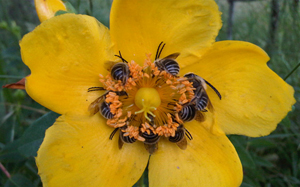FAO: How bees can help raise food security
 What do cucumbers, mustard, almonds and alfalfa have in common? On the surface very little. But there is one thing they share: they all owe their existence to the service of bees.
What do cucumbers, mustard, almonds and alfalfa have in common? On the surface very little. But there is one thing they share: they all owe their existence to the service of bees.
For centuries, this tiny striped helper has labored the world’s fields without winning much recognition for its many contributions to food production. Wild bees, in particular, seemed doomed to slog in the shadow of their more popular cousin – the honeybee – whose day job of producing golden nectar has been far more visible and celebrated.
But bees of all stripes are finally getting their moment in the sun with the publication of a paper that quantifies, for the first time, just how much our crop yields depend on the work of pollinators who unknowingly fertilize plants as they move from flower to flower.
The research comes at a time when wild bees are threatened by a multitude of factors and managed bee populations can’t keep up with the increasing number of plots that grow pollination-dependent crops.
Climate change poses yet another problem, Bees will struggle with the higher temperatures plus, flowers in some parts of the world are now opening at different times than they used to, and the bees are not there to pollinate.
Attracting pollinators to farms is not as easy as planting for the season and waiting for them to arrive.
Maintaining habitat and forage resources all year long is key to wooing pollinators and keeping them on the land for longer periods of time. This can be done by planting different trees and plants that flower at different times in the year, for example.
To read the entire article, please visit FAO site

